
The World's Largest Search Engine Doesn't Want You to Search
Why is Google abandoning its core mission?
Almost everything in the digital world is turning into its opposite.
Social media platforms now prevent people from having a social life.
ChatGPT makes you less likely to chat with anybody.
Relationship apps make it harder for couples to form lasting relationships.
Health and wellness websites make it almost impossible to find reliable health advice—instead peddling products of dubious efficacy.
Product review sites now prevent people from reading impartial reviews by actual users of the product, instead operating as pay-for-play vehicles.
Etc. etc. etc.
You can often tell by the name. PayPal will never pay you a penny, and it’s certainly not your pal. Microsoft Teams only works if you stay away from your team. If you keep using Safari, you will never go on an actual Safari.
But the worst reversal is happening with search engines. They now prevent you from searching.
If you want to support my work, take out a premium subscription (just $6 per month).
I’ve known Google up close and personal from the start. I initially found the company quirky and endearing—but those days ended long ago. The company is now clueless and creepy.
Almost every day I read some ugly news story about Google. Here are a few headlines from a typical week:
“Google ditches promise not to develop AI weapons” (February 12)
“Millions of Google users alarmed after discovering new AI tool they can't turn off” (February 14)
“Google facilitated Russia and China’s censorship requests” (February 15)
“Google’s new fingerprinting policy sparks privacy backlash as ads become harder to avoid” (February 17)
“Google data centers used nearly 6 billion gallons of water in 2024” (February 11)
This company goes out of its ways to do mischief. Messing with people is in its DNA.
Meanwhile, its base business is degrading at an alarming rate. The company doesn’t seem to care.
In a strange turnaround, search engines don’t want you to search for anything. That’s because searching leads you on a journey—and Google doesn’t want you to leave their platform.
The search engine was invented as your gateway to the web. The inventors of this technology tried to index every page on the Internet—so that you could find anything and everything.
That was an exciting era. Search engines were like train stations or airports. They took you all over the world.
At Google today, the goal is the exact opposite. You never leave the station.
Techies once described the Internet as a digital highway. But we need a different metaphor nowadays. Web platforms want to trap you on their app, and keep you there forever.
So, instead of a digital highway, we have a digital roach motel. They let the roaches check in—but not check out.
Yes, you are the roach in this business model.
I’m sorry to say that there’s no room service at this roach motel. But there is AI available round-the-clock.
It will answer your questions. Maybe not very well, but tough luck.
For example, how would you rank the following AI response?
But even when the answers are accurate, they’re still annoying. According to Ashley Belanger, writing in Ars Technica:
Plenty of people have griped about Google's AI overviews since their rollout. A Google search today might force you to scroll through more than 200 words of AI-generated guesswork before you get to a warning that everything you just read is "experimental." Only then can you finally start scrolling real results.
Let me take a less extreme example. After all, Google probably doesn’t really want you to eat rocks. (It’s hard for them to monetize dead users.)
So let’s imagine you want to learn about the collapse of the Roman Empire—a topic of great interest to many dudes.
I’m one of them. Over the years, I’ve read thousands of pages on the subject. It’s a fascinating subject—especially because so many different theories and explanations have been offered by our leading historian.
Somebody once counted all the explanations for the Fall of Rome—and came up with a list of 210 causes.
But Google doesn’t want you to worry about that. So it serves up a bland AI-generated summary—it’s the first thing you see when you do a search on the “collapse of Rome.”
You now know that the Roman Empire ended when the Germanic Warlord deposed Emperor Romulus Augustulus in 476 AD. Google offers three supporting causes—bad economy, bad politicians, and bad military.
End of story.
The search engine once gave us access to many viewpoints, diverse opinions, and alternative approaches to every topic. Now it serves up a single response and gives that ‘official’ opinion precedence over all others.
Even worse, the quality of this ‘official’ response is just slightly better than a high school term paper, and far worse than a human-written encyclopedia entry.
And that’s Google at its best now—a crappy encyclopedia. And often it’s far worse.
Even an inferior encyclopedia wouldn’t replace historical images with AI slop. But Google does this constantly.
In the case of the Roman Empire, you get a better explanation from the 1911 edition of the Encyclopedia Britannica.
The 1911 Encyclopedia Britannica entry on the Roman Empire by J.B. Bury—Regius Professor of Modern History at the University of Cambridge—is more than a century out-of-date. But it still blows all chatbots out of the water.
Here’s how he handles the collapse of 476 AD in three paragraphs.
If you read this, you get smarter. If you slurp up Google’s AI slop, you get dumber.
And that’s Google AI at its best. At its worst, you’re eating rocks.
Why would Google walk away from its demonstrated value as a search engine?
It did an outstanding job providing search results for many years. Then it abandoned its core mission. This makes no sense.
But Google has its reasons:
First, it needs to justify its enormous investment in AI. So (like many other huge tech platforms) it will force AI slop down users’ throats whether they want it or not.
Second, it needs you to stay on its platform as long as possible—where it can serve up ads, track your activities, and maximize its control over your thoughts, preferences, and actions. So Google constrains people from doing real searches.
Third, Google wants to lock out competitors. But almost every other web platform is now a competitor, because the company’s ambition have spread to everything from shopping to media. In this new world of web bunkers, Google increasingly distrusts other platforms, and wants to minimize your contact with them.
Fourth, the desire to maximize profitability leads Google to replace information with advertising. When pushed to an extreme—as has happened—real info is lost in all the noise.
Reddit learned this recently. Many people now do searches on Reddit, instead of Google. (How desperate must you be to trust Redditors—that’s how bad search engines have gotten.) But this makes Reddit vulnerable to a Google backlash.
Of course, Google can’t remove all links from its search results. That would look bad.
But it can reduce the quality of those links by:
Replacing reliable sources with paid advertising.
Removing factual information that might upset totalitarian regimes—which it now does on a routine basis.
Rewarding compliant partners, and punishing independent voices.
Making it hard to figure out which links are genuine and which are pay-to-play.
This is why people are losing confidence in this company.
And that’s not just my opinion. If you ask Google’s ever-present AI chatbot, it admits it.
For once, I agree with the bot.
But it would be wise for the company’s leadership to listen to these complaints.
There will be a backlash—probably from both politicians and users. The dissatisfaction is growing, and I sense an intense anger and outrage that didn’t exist just five years ago.
Sooner or later, advertisers will also complain. They pay for placement because people trust Google. When that trust erodes, the value of ad placement in search results also declines.
The tech overlords should constantly remind themselves that even huge companies can disappear. A hundred years ago, Sears was the largest retailer in the world—nowadays it barely survives (with 8 stores left).
Sears, too, got arrogant. When Walmart listed on the stock exchange in 1970, Sears should have paid attention. Instead it was busy building the largest skyscraper in the world.
Others have suffered similar collapses—Kodak, Woolworth, Blockbuster, MySpace. Toys R Us, and the like.
The bosses at Google can’t believe this will ever happen to them. But they are wrong. The trends are unmistakable—just consider the arrogance, the lack of focus, the indifference to quality, the growing hostility of the public, the backlash from politicians and regulators….
We learned above that there were hundreds of reasons for the collapse of Rome. The same will prove true for Google.
But there is a solution, and a simple one, too.
Let people use search engines to search.
The technology exists. Google knows this more than anyone. It just needs to remember how it’s done.
And if Google’s tech overseers refuse—as they will, by all indications—they should prepare themselves for the inevitable payback. I have a hunch that, when those consequences finally arrive at Google’s doorstep, nobody will need an AI chatbot to summarize their meaning.

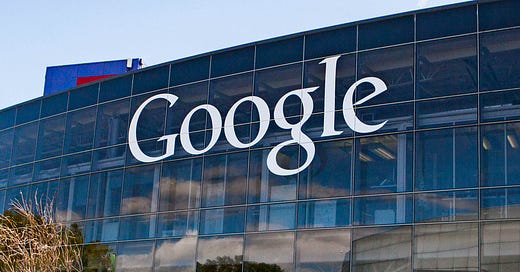



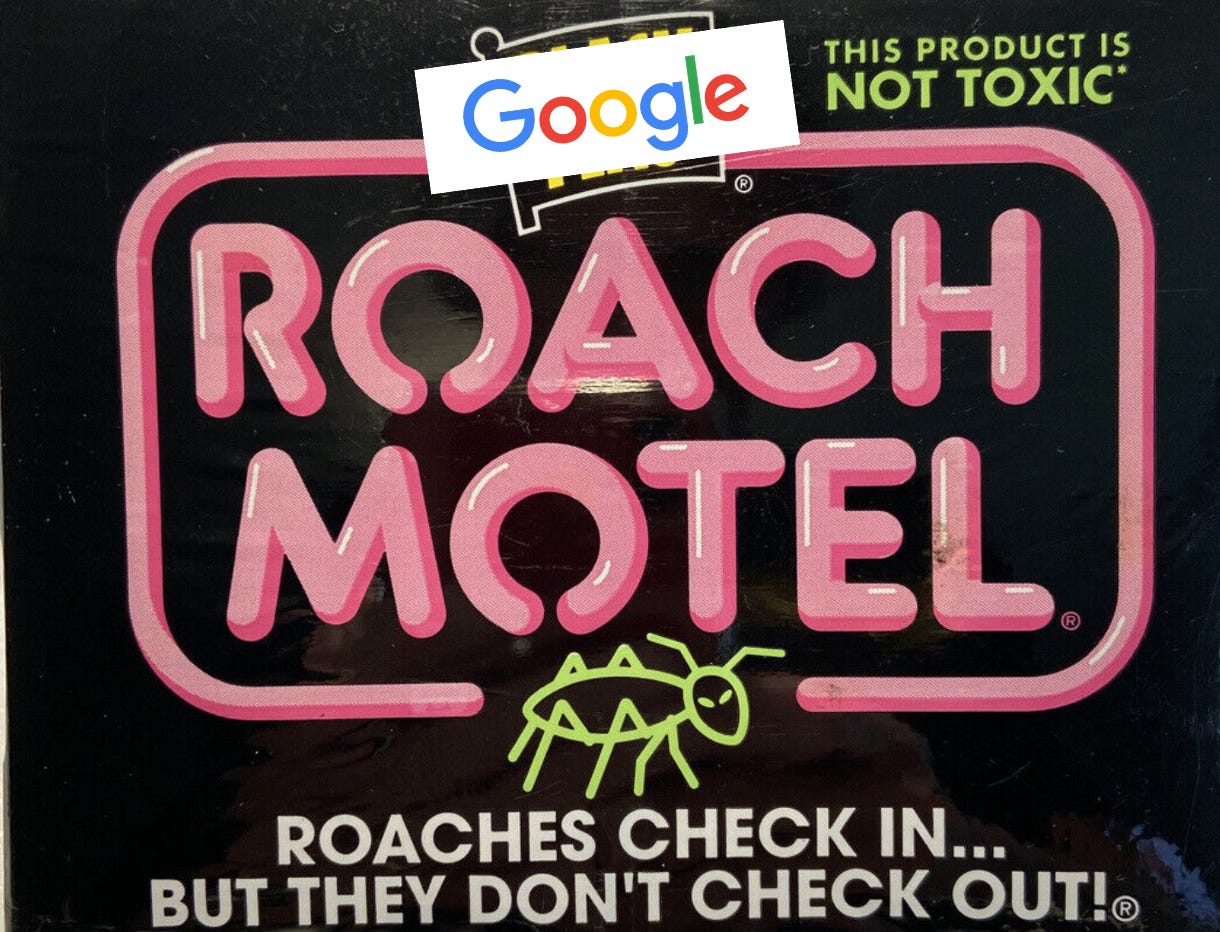
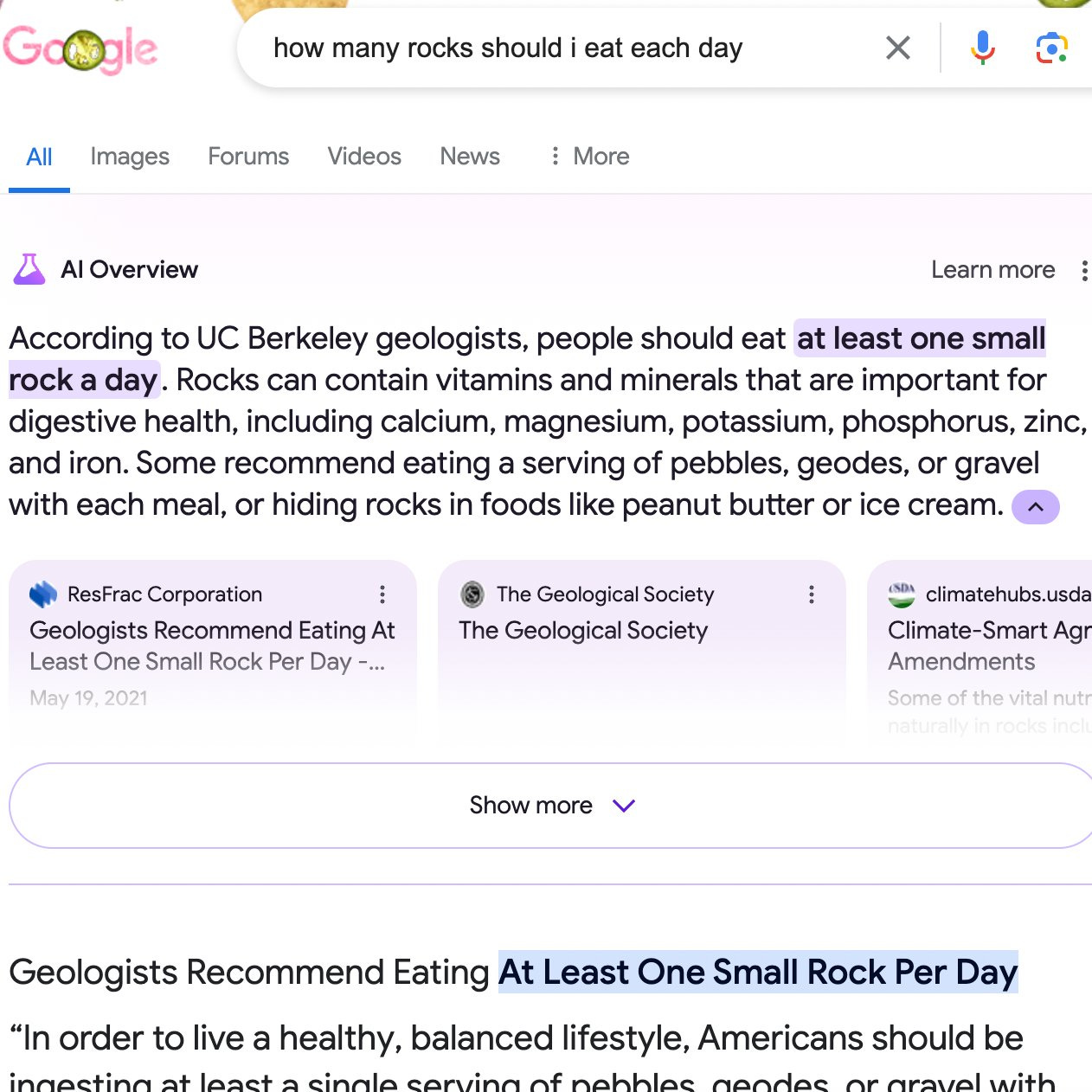
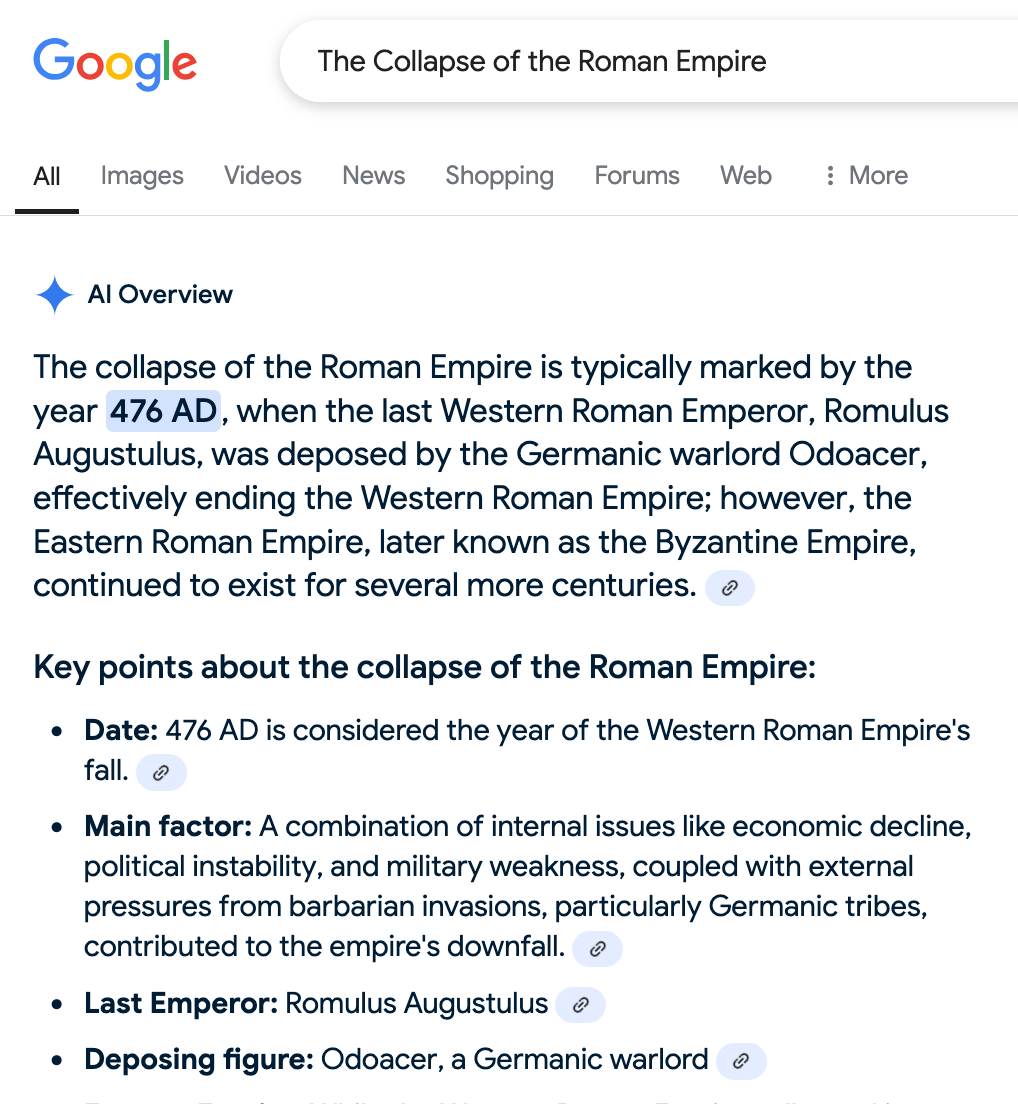


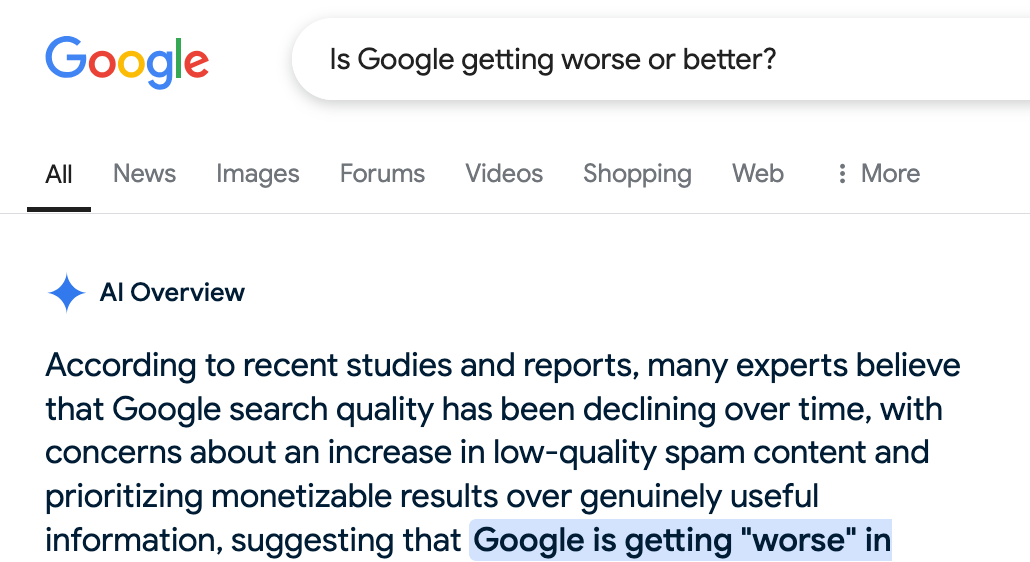
This is basically enshittification as coined by Cory Doctorow. You see the same thing on Amazon, the top links are always sponsored ads, frequently for items that even appear organically in their search a few items down. Basically, companies serve their customers up to the point where they have a big, locked-in user base, then pivot to serving other constituencies (employees, investors, partners, advertisers etc.) as the users aren’t going anywhere unless the user experience degrades to the point where users will consider alternatives despite the switching costs. So at this stage the goal of companies is to do as little for users as possible while not pissing them off so much they leave, resulting in user experience getting shittier and shittier over time.
Well written, Ted, I'd like to remind all of your readers that you have many alternatives that won't sell your data, make a profit off of you, or sell your information to governments:
Email alternatives: ProtonMail, Posteo, Mailbox, Fastmail, Tutanota, and more.
Web Search Alternatives: Ecosia, Orion browser, DuckDuckGo, and more.
There's alternatives. They might cost you money. But you can feel better about not contributing to the climate problem with unnecessary AI summaries that are using serious amounts of energy. Some estimates put it nearly 6.9-8.0 WH of energy per search. Ten searches and you've already used a lightbulb for an entire hour. "They also found that generating two images with AI could use as much energy as the average smartphone charge."
https://www.scientificamerican.com/article/what-do-googles-ai-answers-cost-the-environment/